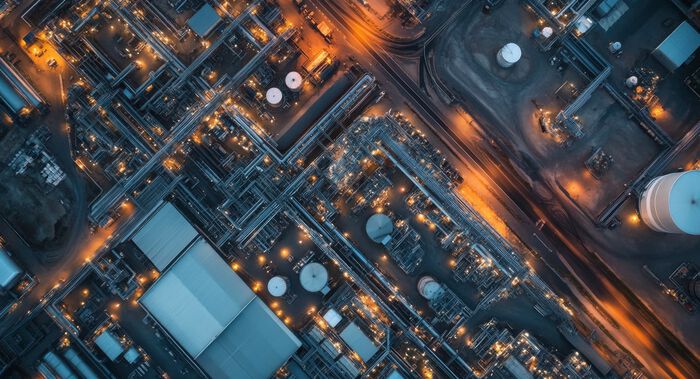TOPICS & NEWS
Articles and interviews on current trends, technology and industry challenges, information on our consulting services, seminars and events as well as company topics:
Here you can find out what drives EFESO.
Articles and interviews on current trends, technology and industry challenges, information on our consulting services, seminars and events as well as company topics:
Here you can find out what drives EFESO.
Experte: Fernando Cruzado, Partner, EFESO | 06/24/2025 | Teilen auf in

The chemical industry serves as one of the most alarming indicators of how significantly the European industrial model has come under pressure. A sector long considered a strategic pillar of the continent’s industrial infrastructure now finds itself in an unprecedented competitiveness crisis. Behind stagnant plant utilization, site closures, and declining investment lies a more fundamental shift: the ongoing deindustrialization of Europe. This now-structural dynamic of market transformation is neither new nor inevitable – it calls for an urgent, systematic, and coordinated response.
A comparison with other global regions reveals that European producers are finding themselves in an increasingly weakened position in international competition. Energy costs, which account for up to 30% of production costs in the chemical industry, remain two to three times higher than in the United States or China. This price gap undermines the entire value chain, from raw materials to finished products. At the same time, regulatory pressure continues to mount. Environmental policy decisions rightly impose imperatives for action, but long approval times, regulatory uncertainty, and associated overhead costs are deterring investment. Industrial projects today face an unprecedented level of administrative complexity, undermining both their economic viability and strategic agility.
It is also important to highlight that Europe’s traditional strengths – skilled labor, innovation capacity, and integration into regional ecosystems – are gradually eroding. Competing economies, on the other hand, are taking bold steps: the United States is easing regulatory constraints and massively subsidizing strategic projects, while Asian countries are rapidly expanding their production and innovation capabilities.
Given the structural crisis, the European chemical industry can no longer rely on tactical adjustments alone. The response must be strategic, systemic, and collective. In the recent Antwerp Declaration, signed by over 70 industrial players and professional associations, a European industrial pact is explicitly called for – with the aim of restoring the competitiveness of strategic sectors, starting with the chemical industry, which plays a key role in almost every value chain.
In Brussels, structural measures are currently under discussion: revising state aid mechanisms, streamlining approval procedures for industrial projects, and securing access to competitively priced energy. A roadmap is also being developed to implement a dedicated action plan for the chemical industry. This plan envisions support mechanisms similar to those in the United States (such as the Inflation Reduction Act), including subsidies for transition projects and incentive-based tax policies for strategic investments.
In this context, industrial companies also play a crucial role. Several European corporations have already launched ambitious programs. BASF, for example, announced a plan to reduce its cost base by €1 billion by 2026, which includes downsizing the company and restructuring sites in Germany. Other examples show how sustainable cost reduction programs can significantly enhance organizational competitiveness.

A chemical company launches a joint performance improvement initiative with EFESO across twelve plants on four continents. Significant improvements in cost drivers and margins are achieved within a short period.
Adapting to the new economic environment requires a fundamental revision of operating models. First, through fixed cost reduction and structural adjustments. These should include industrial streamlining initiatives or asset-sharing projects, particularly in maintenance, procurement, and logistics. Second, through increased integration of digital tools. Many manufacturers are increasingly deploying “smart” automation solutions—such as drones for plant inspections, packaging robots, or IoT sensors for predictive maintenance. In addition, advanced analytics tools are increasingly improving process yields and stability.
These developments are not solely aimed at generating economic gains. Innovations—especially in the fields of recycling and sustainability solutions—can also help mitigate the dual pressure created by regulatory and societal demands related to industrial sustainability. Arkema, a French producer of petrochemical products, is investing in the production of recyclable high-performance polymers and aims to reduce its absolute greenhouse gas emissions by nearly half by 2030. UPM is investing in a highly innovative biorefinery in Leuna, which is set to produce biochemicals on an industrial scale for the first time, with operations starting in 2025. These are just a few examples of how the European chemical industry can reposition itself competitively in the global market.
By nature, the chemical industry sits at the beginning of almost every industrial value chain. Its decline is not a sector-specific issue but an early indicator of a broader industrial trend. Addressing this challenge does not mean abandoning environmental goals, it means adapting how they are implemented: through solid industrial planning, economically sustainable transition strategies, and a regulatory and energy policy framework that reflects the importance of strategic value chains.
|
|
Thank you for Signing Up |


This website uses cookies. Those have two functions: On the one hand they are providing basic functionality for this website. On the other hand they allow us to improve our content for you by saving and analyzing anonymized user data. You can redraw your consent to using these cookies at any time. Find more information regarding cookies on our Data Protection Declaration and regarding us on the Imprint.
Click here for Cookie Settings.

